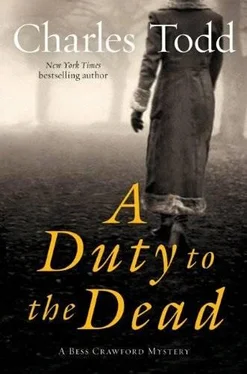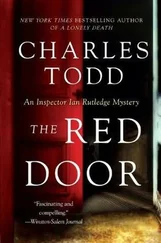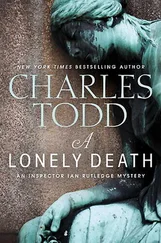I told him about the conversation I’d had with Jonathan, but he shrugged it off. “All the more reason, if Booker was asleep, to wonder about this print. I have come to the conclusion that Mrs. Denton, Sally’s mother, must have come to see him, and she distressed him to the point that he finished the botched job.”
“Oh, dear God.” I remembered my conversation with Mrs. Denton, and I thought she might well have come and undone all the good I’d felt I’d accomplished. Or had I simply been congratulating myself over my skills, and not seen the fact that Ted Booker was trying to put my mind at ease, not the other way around?
“I can’t believe-I mean, that’s tantamount to murder!” I whispered.
Dr. Philips looked around, then said softly, “I doubt she knew what the outcome could have been.”
“But she’d watched him for weeks-she’d seen how fragile his state of mind was-she did know. She told me that both her daughter and her grandson would be better off if Ted had blown his head off with that shotgun.”
“Yes, but what am I to do about this?” Dr. Philips asked, leaning back in his chair, lines of worry etching his face in the pale light from the windows. “Do I go to the police? What if I’m wrong? I’ve caused trouble for her for nothing. And it wouldn’t do my own reputation here any good. A good many people sympathized with Sally and her mother. They knew Booker could be violent, and they forgot he was a soldier who had been wounded in spirit rather than flesh.”
“Did you speak to the rector?”
“No. He’s not-worldly?-and would feel obliged to go to Mrs. Denton and pray over the state of her soul. What good would that do either of them?”
“I take your point,” I answered slowly. “And you can’t go to the police.” I sighed and watched a small boy racing down the street, spirits high as he and his dog chased a goose that had escaped from the farmer’s wife lumbering in their wake. “Ted Booker is dead. Nothing is going to bring him back again. And he’d probably refuse to come, even if by some miracle he could be offered the chance. And Sally is probably better off. She’d never learn to cope with his moodiness, even if he tried to heal.”
“Are you saying I should just keep my mouth shut and try to forget this whole business?”
“No, of course you can’t do either. But since the only proof is a footprint that was there then and now isn’t, there’s nothing concrete to support your suspicion. And you did give testimony at the inquest that Ted Booker was not in his right mind. You’d be changing that, in a sense. I don’t see that you can accomplish anything by raising the issue. In time, Mrs. Denton’s conscience might get the best of her.”
“A deathbed confession? I was hoping you might have a brilliant idea I could use,” he said. “I’ve exhausted even my own patience.”
“If Mrs. Denton meant no harm,” I said, “then while it was foolish to visit Ted so soon after his attempt at suicide, she might have wanted assurances.” I added, “However glad she might be now, to have him dead, it will come to haunt her.”
But Dr. Philips was more realistic. “I doubt it. Well, I’ve burdened you, and neither of us has come up with a solution. Still, I’m relieved in a way. It helps to talk through one’s troubles.”
I wished I could talk through my own. But I dared not tell this man that the missing Peregrine Graham was alive and probably standing at a window not fifty yards from where we sat.
He paid for our tea and he saw me as far as the rectory before returning to his surgery.
The rector was quite surprised to find me at his door. He offered me tea, but I refused as politely as I could.
“What brings you here, my dear? I know a troubled spirit when I see it. If I can help-”
“I’ve been thinking,” I said, careful how I began, “about the journals your predecessor kept. Do you think-would you mind if I read them? I attended Peregrine Graham when he was ill, and now they tell me he’s dead. It would do no harm if I learned more about the crime that put him where he was.”
“They reported that he’d stolen a pistol from the asylum,” the rector said, “and they feel he must have used it on himself. How sad. I asked Mrs. Graham if perhaps she would consider a memorial of some sort-a private service, a marker in the churchyard, whatever might suit the family. But she felt that it would be rather-a reminder of something the family preferred to leave as a closed subject.”
“You mean the family didn’t wish to inter the-er-remains?”
“Jonathan Graham couldn’t be sure, you see. I expect Mrs. Graham felt that a memorial would be rather-premature.”
And the family of Lily Mercer had been paid to emigrate to New Zealand. I wondered suddenly if they had prospered there, or if the change had made them wretched.
“I can appreciate the Graham family’s feelings, though I don’t share in them,” I replied. “But for the sake of my own conscience, I’d like to know why I felt that the man I treated had-er-paid for his sins and deserved credit for that.”
“I see.” He hesitated. “The journals were solely for the purpose of guidance. I’m reluctant to take a broader view of my charge to keep them private.”
“And private they should remain. I’ll be taking up my new assignment shortly, and there’s no harm I could do, surely-even inadvertently.”
After a moment he went up the stairs and I sat there, looking across the churchyard to what I could see of the Graham house. Timothy limped through the gate at the far end of the churchyard and paused for a moment at a fresh grave, the earth still raw, waiting for spring to give it new life. And then he went back the way he’d come.
Ted Booker’s grave? Or a friend who’d died in the war? At this distance, it was hard to tell.
The rector returned with several bound books in his hands and said, “These cover a longer period before and after the time you’re interested in. But short of tearing out the pages, there is little I can do but to trust to your good faith.”
“It won’t be misplaced, I promise you.”
After a few more minutes of conversation, he gave me a small case to carry the books, and I took my leave.
He saw me to the door, and I could feel him gazing after me as I walked back the way I’d come.
Peregrine must have seen me walking in his direction, and as I waited to cross the High Street he must have come to meet me, because I found him waiting at the top of the hotel stairs, his gaze going directly to the box under my arm. I shook my head, and he followed me in silence to my room, where we pulled the tea table to the window and I opened the box.
The bound books were a little musty, as if they’d been stored on a study shelf for years.
I opened the first, after asking Peregrine if he knew the date of the murder. And of course he did, it was seared in his memory forever. But the volume I opened was a later date, and so I tried the second in the stack.
It covered the right period. I skimmed over comments about the births and deaths and marriages of various Owlhurst inhabitants, about the business of the parish, and a brief record of whatever had happened on a particular date that was notable. I saw that the owner of The Rose and Thorn had died and his son had taken over management of the hotel, that the man who cleaned the stained glass in the church had fallen to his death one morning, as his ladder tipped over. Many rectors were amateur historians, more passionate than trained, and their privately published works were often very readable.
Moving on, I came to the comment “Mrs. Graham departed for London this morning, and I shall have my choice of the offertory hymn while she is away. Very kind of her.” I thought that last was a dry commentary rather than an expression of real gratitude.
Читать дальше












